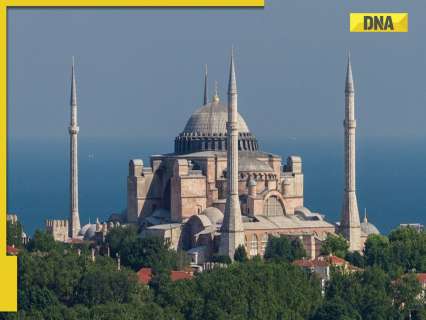Is there no waqf board in Muslim countries like Turkey, Libya, Egypt, Sudan, Lebanon, Syria, Jordan, Tunisia, and Iraq? Is it true or just one more lie told by our honorable members in Parliament? This question is being asked after BJP MP Sambit Patra said in Lok Sabha that there is no waqf board in any of these countries. Worse, the government agency Press Information Bureau (PIB) also claimed it. Turkey However, a cursory study reveals that the waqf board exists in all of the above-mentioned countries.
Waqf not only exists, it also thrives in Turkey. It is proved by the fact that the grand Melike Hatun Mosque is run and controlled by Vakıf Eserleri Muzesi – the Waqf Works Museum as is evident by a signboard put on it. It should also be kept in mind that in Turkish, "waqf" is written as Vakıf, and in English, it translates to "foundation.

" There were 1,002 Social Aid and Solidarity Waqfs in Turkey in 2018, with at least one branch operating in each district. The main objective of the waqf is to provide direct financial and material assistance to impoverished and vulnerable populations, addressing essential needs such as food, shelter, education, and healthcare. Not only this, according to the regulation introduced in 2018, the government returned 77 properties to the waqf board in Istanbul alone.
The iconic mosque of Hagia Sophia is one of them. Turkey has five categories of waqf at present. They are: Fused (Mazbūt) Awqaf, New Awqaf (established after 1926), Annexed (Mülhak) Awqaf, Minority Awqaf (belonging to non-Muslim communities), and İrsādī Awqaf (state-established endowments).
According to Maraşlı, Turkey had 52,000 registered mazbut waqf, 5,268 new waqf, 256 annexed (mulhak) waqf, and 167 minority waqf in 2019. Egypt In Egypt, there is a separate ministry to handle waqf, called the Ministry of Awqaf of Egypt. There are religious endowments, awqaf, which are similar to common law trusts where the trustee is the mosque or individual in charge of the waqf and the beneficiary is usually the community as a whole.
They have plots of land, markets, hospitals, buildings that would aid the community and many other things. Sudan The waqf system of Sudan dates back to the 7th century when the Arab Muslims established it. It has historically played a crucial role in public life, especially in funding educational and welfare programmes.
Many waqf assets have become unproductive in recent times, and the system has been reformed after facing challenges in sustaining its historical role. Lebanon After World War I came to an end in 1920, the League of Nations mandated that Lebanon would be administered by France after the Partition of the Ottoman Empire. After the establishment of the French Mandate, the High Commissioner reorganised the law of Waqfs in Lebanon.
Special legislation was brought as all waqfs at that time were based essentially upon Qur’anic law rather than secular law. In addition to the Islamic charitable Waqf, the Christian communities have also adopted a similar concept of Waqf regulated by each community’s specific law. Libya Libya lacks a distinct "Waqf board", iy but has a government body that monitors religious endowments under Islamic law.
This authority ensures that Waqf properties, such as mosques and charitable institutions, are used for their intended purposes. Syria According to the government of Syria's official website, it has the Ministry of Awqaf that oversees Waqf properties. The ministry regulates endowments for mosques, schools, and charitable purposes, despite disruptions from the civil war.
Jordan Jordan, too, has a Ministry of Waqf, established under Law No. 5 of 1969, which oversees Waqf properties and Islamic affairs. Its website details its role in managing endowments, confirming a structured Waqf system.
Iraq Iraq has separate waqf bodies for Sunni and Shiite waqf properties. They oversee endowments for mosques, schools, and charitable purposes. These diwans have operated for decades, contradicting the claim of no Waqf system.
.
Health

Is there no waqf board in Muslim countries as claimed by BJP in Lok Sabha? Do Turkey, Jordan, Lybia, Lebanon, Syria have...

Is there no waqf board in Muslim countries like Turkey, Libya, Egypt, Sudan, Lebanon, Syria, Jordan, Tunisia, and Iraq? Is it true or just one more lie told by our honorable members in Parliament?















